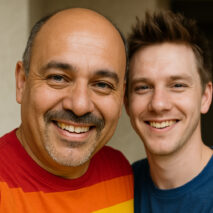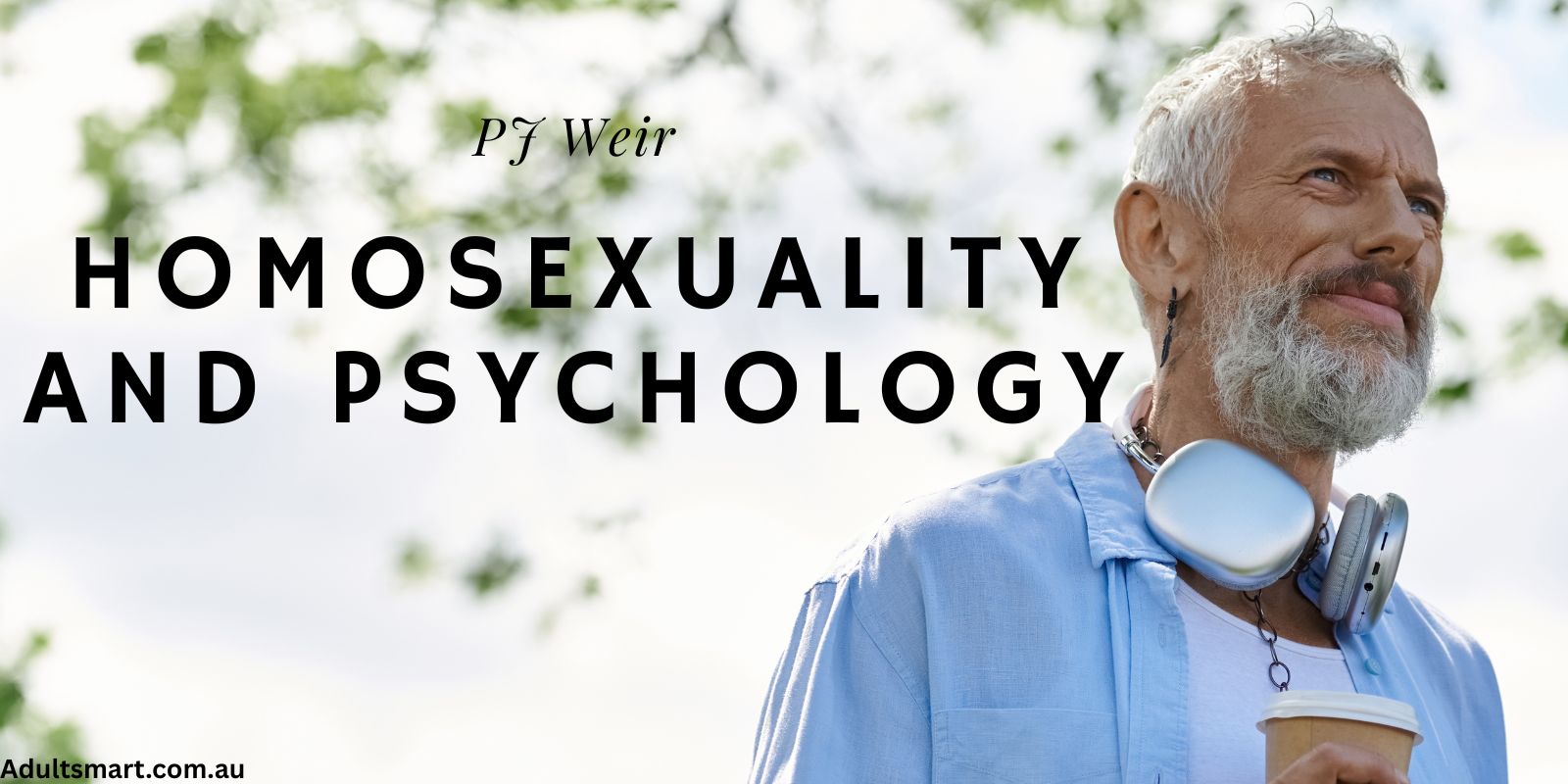Homosexuality and Psychology: Understanding Mental Health in Gay Lives
Pj Weir here, sharing how homosexuality and psychology shape the mental health of gay men, drawing from my advocacy for resilience and support. This guide offers insights to navigate challenges and build fulfilling lives with courage.
Table of Contents – Homosexuality and psychology
- What Did Wight Investigate In His HIV/AIDS Study?
- Why Do Mature Aged Gays Make Great Partners?
- Homosexuality and Psychology: Why Men Need to Reach Out for Help
- Key Takeaways
- FAQ
Gay men who are elderly are considered a minority in terms of sexuality. These men have typically lived a different lifestyle with their younger partners. During their youth, being openly gay was not socially accepted. HIV was widespread and forbidden, and sexual segregation was the norm.
In today’s world, the gay community is more accepted and open. As people get older, they have to deal with health issues, death, loss, and financial instability. These can have a significant impact on their mental well-being.
Aging gay men face additional stressors that can worsen these issues. This could be due to the discrimination they have faced throughout their lives. Richard G. Wight, Ph.D., from the Department of Community Health Sciences at the School of Public Health, University of California, Los Angeles, recently conducted a study to determine the factors that have the most significant impact on the mental and physical health of aging gay men.
What Did Wight Investigate In His HIV/AIDS Study?
My decades advocating for gay rights have revealed how homosexuality and psychology intersect, shaping mental health in profound ways, as explored in Richard G. Wight’s pivotal research. His study, part of the Multicenter AIDS Cohort Study, one of the largest HIV/AIDS studies in the U.S., surveyed 202 gay men aged 44 to 75 to examine minority stress factors like stigma, discrimination, and HIV-related challenges. HuffPost’s coverage of gay elderly issues highlights shared concerns, such as financial independence and declining physical health, affecting both gay and heterosexual men. These universal aging struggles underscore the need to address how societal pressures uniquely impact gay men’s mental well-being.
Key Findings on Mental Health
Wight’s findings showed a direct link between being gay and elevated depression rates, driven by perceived stigma and the heavy burden of HIV-related challenges. Older gay men, having faced decades of societal rejection, often carry deep-seated shame that intensifies emotional struggles, making everyday stressors feel overwhelming. In my community work, I’ve seen how these pressures persist, yet emotional support from relationships—romantic, familial, or platonic—acts as a vital shield against depression. These bonds foster resilience, offering a lifeline for men navigating complex mental health landscapes, helping them find strength amidst adversity.
The study revealed that gay men in committed relationships reported the highest mental well-being, a finding that resonates with my advocacy for love as a stabilizing force. Since same-sex marriage gained broader acceptance, this protective effect has strengthened, highlighting the power of partnership in combating psychological distress. Wight’s research urges further exploration into conditions like substance use, anxiety, and social isolation, as mental health remains a critical concern in the gay community. Today, with greater societal acceptance of homosexuality in the U.S., mental well-being is improving, yet ongoing research, community support, open dialogue, and accessible mental health resources are essential to empower gay men to thrive authentically, overcome past traumas, and build resilient, fulfilling lives.
Why Do Mature Aged Gays Make Great Partners?
Experience:
In most cases, but not always, older individuals have a better understanding of the situation at hand. They are more willing to share their knowledge with younger or less informed individuals, whether in a casual setting or during a formal meeting.
This experience often extends beyond relationships and into life skills, careers, and emotional stability. They’ve faced challenges, built resilience, and gained wisdom from past successes and failures. Younger partners often appreciate this steady guidance and the comfort that comes from being with someone who has “been there and done that.”
Conclusiveness:
When a man reaches a certain age, he usually has a clear understanding of his desires and is unafraid to express them. This may be due to the realization that time is limited and he does not want to spend it in uncertainty.
Older men tend to cut through the noise and avoid games, which creates more honest and direct communication. They know how to vocalize their needs and wants to avoid wasting precious time. This clarity reduces misunderstandings and can help build a stronger, more fulfilling relationship for both partners.
Developed physicality:
It surprises me that many young men are attracted to older bodies for various reasons such as gray hair, extra weight, and wrinkles. These qualities are sought after by younger men who are physically interested in a mature physique.
There’s also confidence in how mature men carry themselves. They often embrace their bodies as they are, which can be very attractive compared to younger partners still finding their self-image. This self-assurance, combined with physical features that show age and character, creates a unique appeal that goes beyond the surface.
Cash:
It’s a fact that some twinks and even some older people are interested in money. When in a relationship with someone who is financially stable, it can bring a sense of security during times of uncertainty. Personally, I often refer to myself as a sugar-free daddy.
Financial stability doesn’t just mean material gain — it also reduces stress and allows couples to focus on enjoying life together. Travel, shared experiences, or simply not worrying about bills can strengthen a relationship. While money shouldn’t be the only reason for being with someone, the reassurance it brings can add to the sense of partnership.
Mentorship:
A lot of young men are struggling to find career and educational guidance due to lack of support from their homes and society. Many of them may have faced discrimination based on their sexual orientation and are unsure about their future.
Older gay men who have gone through similar experiences can provide valuable advice and perspective. They can act as mentors by sharing lessons from their own lives, offering emotional support, and even guiding younger partners in building confidence. This mentorship doesn’t just help in careers — it often empowers younger men to feel more secure in who they are, both inside and outside a relationship.
Homosexuality and Psychology: Why Men Need to Reach Out for Help
When I look back at my years in activism, one of the issues that never lost importance was mental health. Too many gay men have been told to stay silent, to “toughen up,” or to hide what they feel. These messages don’t fade easily. They leave scars that can affect every part of life, from relationships to work. Homosexuality and psychology have long been linked in public debates, but too often the voices of gay men themselves are ignored in these discussions.
Seeking help is not a weakness. It is an act of courage. I’ve spoken with men who carried years of shame before finally reaching out, and the relief they found was life-changing. Trained professionals can provide tools to cope with anxiety, depression, and trauma, but they can only do so if men take that first step. Talking to a friend, visiting a GP, or joining a local support group can start the process. These small actions create space for healing and growth.
We also need to recognise the value of peer support. Some of the strongest moments in my life came from sharing stories in community groups and hearing “me too” from across the room. It reminds us that none of us are alone. Reaching out is not only about getting help, but also about giving others the chance to support us. That exchange of care builds resilience, which our community has always relied on.
Aneros Helix Syn V and Mental Wellbeing
Sexual health and mental health are often connected, and finding the right toy can make both stronger. The Aneros Helix Syn V is a prostate massager designed for comfort and control, giving men a way to explore pleasure safely. By promoting relaxation and improved circulation, it supports not just sexual release but also stress reduction. For men carrying the weight of stigma or anxiety, creating space for pleasure and self-care is more than indulgence — it’s part of recovery. Investing in tools like this reminds us that caring for the body can be a step toward caring for the mind.

Key Takeaways
- Older gay men often bring life experience, confidence, and stability into relationships.
- Clear communication about needs and desires strengthens connections at any age.
- Mature partners may offer mentorship and guidance to younger men facing social or personal challenges.
- Financial stability in relationships can ease stress, but emotional support remains just as vital.
- Mental health is a community issue — seeking help is a strength, not a weakness.
FAQ – Homosexuality and psychology
Why are older gay men sometimes preferred as partners?
Many younger men are drawn to older partners for their confidence, lived experience, and emotional clarity. These qualities often bring a stronger sense of security in relationships.
How does age impact relationships between gay men?
Age can bring more self-awareness and better communication. Mature men often know what they want and can express it without hesitation, which helps reduce uncertainty.
What role does mentorship play in same-sex relationships?
Mentorship can be both personal and professional. Older men who have faced discrimination or hardship can guide younger partners with empathy and practical advice.
Why is mental health support important for gay men?
Stigma, isolation, and past trauma often weigh heavily on gay men. Accessing therapy, peer groups, or community support helps build resilience and improve overall wellbeing.
Is financial stability the main reason younger men date older partners?
Not always. While money can add security, most relationships thrive because of shared respect, attraction, and the sense of comfort that maturity can provide.

Meet PJ Weir, former Gay Exchange stalwart and gay rights advocate. Now caring for his mother in Queensland, he reflects on a decade of LGBTQ+ activism.








Leave a Reply